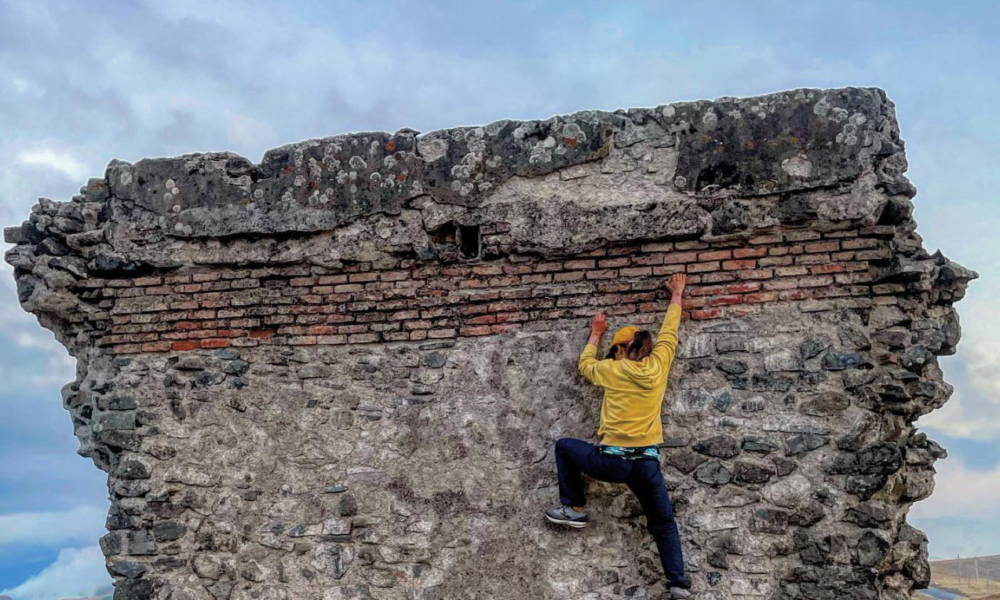Content Warning: Gender-based violence, misogyny, suicide
On Oct. 16, Elnaz Rekabi, a 33-year-old Iranian rock climber, competed at the International Federation of Sport Climbing (IFSC) Asian Championship in Seoul. Rekabi—who, just last year, became the first Iranian woman to win a medal at the IFSC World Championship—competed without a hijab, defying the strict dress code restrictions that the Iranian government enforces on women, including its women athletes abroad.
Rekabi’s climb comes in the wake of the murder of Jina (Mahsa) Amini, a 22-year-old Kurdish woman who was tortured and killed in Tehran by morality police for violating the Islamic state’s mandatory hijab laws. Since Amini’s death, nationwide protests and increased state repression have gripped Iran, leaving many to see Rekabi’s climb as an act of resistance.
Shortly after the competition, where she finished fourth, Rekabi disappeared and severe concerns for her safety began to circulate. BBC Persian reported that Rekabi’s passport and mobile phone had been confiscated prior to boarding a plane back to Iran. Early on Oct. 18, an Instagram story was posted from an account said to be run by Rekabi claiming that her hijab “unintentionally had a problem.” It said that she was unexpectedly called on to climb, and that she would be headed back to Iran on her regularly scheduled timeline despite returning a day earlier than anticipated.
When Iranian athletes go abroad for international competition, the government often forces them to leave collateral in order to guarantee their return to Iran. Before leaving for Seoul, Rekabi handed over a cheque for over $35,000 and granted full power of attorney to Iran’s Mountaineering Federation to sell her family’s property if she did not return.
Upon her arrival back in Tehran, Rekabi was met by a huge gathering of supporters who united in the hopes of deterring her arrest. In an interview with state television, Rekabi reiterated that her move to compete without a hijab was inadvertent. However, BBC Persian reported that this apology came as Rekabi had been threatened with the seizure of her family property.
Rekabi was then held at the National Olympics Academy of Iran under the watch of plainclothes officers, where she met with Iran’s sports minister. Despite previous statements by Iran’s Olympic chief that no punishment would come to Rekabi, she has since been placed under house arrest with the pretext of a post-competition “resting period.”
The oppression of female athletes extends across borders. Rekabi’s story bears resemblance to that of Peng Shuai, a Chinese tennis player who was first forcibly disappeared, and then abruptly retired after making sexual assault allegations against a former Chinese vice-premier.
Rekabi is only the second athlete to defy the Iranian government’s compulsory dress code. In April 2019, Sadaf Khadem became the first Iranian woman to win an official boxing match, defeating Anne Chauvin. Khadem elected not to wear hijab during competition and feared that she would face arrest upon returning to Iran. She has since defected to France.
Iran has a long and troubling history of silencing its outspoken athletes. Navid Afkari, an Iranian wrestler, was executed following his involvement in anti-government protests. Iran’s only female Olympic medalist, taekwondo athlete Kimia Alizadeh, is one of several Iranian women who have chosen to defect from the country altogether. With few exceptions, female sports fans are barred from entering soccer stadiums in Iran. In September 2019, Iranian soccer fan Sahar Khodayari died in protest after setting herself on fire at a courthouse while facing trial for trying to enter a stadium disguised as a man.
Current players on Iran’s national soccer team chose to cover their country’s emblem as the national anthem played during a match against Senegal following Amini’s murder, and forward Sardar Azmoun expressed support for the ongoing protests.
The women’s rights movement in Iran and continued fear for Rekabi’s future and safety must serve as reminders that sports and politics will forever be intertwined. The oppression of women athletes embodies the state’s broader attempt to regulate women’s bodies—a prerogative that is not exclusive to non-democratic nations, from the United States’ rush of anti-abortion laws to France’s hijab ban. Women’s lives depend on the freedom to choose what they do with their bodies, in sport and in every aspect of life beyond it.









Pingback: Qatar World Cup 2022: Notable moments from week one - The McGill Tribune